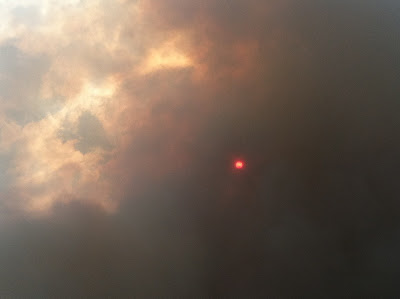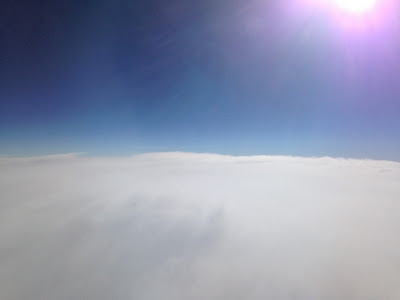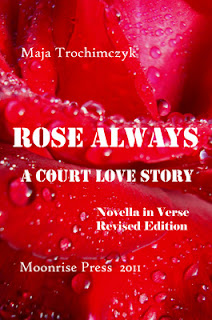dragon eye of the sun
looks at the scorched earth -
wildfire
charcoal on the left
charcoal on the right -
210 after fire
flames dance and scorch
firemen dance with water among them
our hearts dance to thank them
Their bravery and dedication is beyond doubt - but, in fact, expected. They are all owed our unbounded gratitude, fire after fire, year after year. They risk their lives to protect ours.
What was the greatest surprise for me in the La Tuna Fire was the bravery of about ten ordinary citizens who instead of sheltering in their homes, opted to save the cultural gem of the foothills, the McGroarty Arts Center on the slopes adjoining to the area that first started burning and continued through Friday, Saturday and Sunday, with flareups on Monday.
Willow Bosco and her mother Austina, McGroarty Board member, stayed at the Center overnight; Willow, a delicate young student, with remarkable strength handled the hose, soaking the Center's roof and walls, and all the nearby trees with water. Volunteer firefighter Bill Myers brought the extra long hoses and used them, working along with other volunteers, whom I met on Sunday afternoon, to soak burning trees on Saturday and ensure that all vegetation and ground were thoroughly wet to prevent further flareups on Sunday. The fire came down the hill and some trees in the park surrounding the Center burst into flames. We were perilously close to losing this cultural landmark, the home of the former poet laureate of California, John Steven McGroarty. The flareups were extinguished thanks to heroic efforts of Willow, Austina, Bill and many others whose names I did not get...
Ray Yocum, ceramics teacher was a fireman for three days.
Willow Bosco took out fires with water
Bill Meyers and Michelle Ramage
he says he "only brought the hose"
she that "only came with food"
Austina and Willow Bosco
Austina says she did not do it, just the neighbors
and her beautiful, brave daughter
they smile, relieved
after red-black days of fighting fires -
they saved the foothills' gem
Thank you to the heroes and heroines of the McGroarty Arts Center! Willow and Austina Bosco, Ray Yocum, Michelle Ramage from the McGroarty Arts Center, and the MAC's neighbors: Bill Meyers, Kenny Webb, Ben Grupp, Will Meyers, Chris Hall, and Curtis Cunningham.
red bird in the sky
brings blue water to red flames
for victory of blue
Paper, not gold. My jewelry was stolen earlier, half of it, at least... along with my real camera, photo backup drive, family heirlooms, and more. For the whole week I was searching through, checking the losses, so the fire was not the threat that it seems to have been. Clothes and electronics can be replaced, but who will repaint an artwork that took Toti O'Brien 18 years to make? Square by square, drawn and embroidered, it came into being to adorn my wall...

Sweet Relief by Toti O'Brien and its author.
treasure on my wall
eighteen years in the making -
sweet relief
Such is life in the foothills in dry, fire-prone California: waiting for the next wildfire, packing precious documents to be saved in case the flames come too close, hoping that this one and the next one will pass us by... And admiring the mountains, or rather the bare hills and canyons, covered with the velvet of green grass in the spring, with the velvet of gold grass in the rest of the year.
I wrote several poems about these mountains, and here's an older one.
Mountain Watch
They are a bit vain, aren’t they
these mountains of ours, still young.
They like being washed by the rain,
making themselves pretty for sunset.
Wet soil turns into a mudbath
for these giant beauties.
When they stretch and practice
their dance moves, our houses crumble.
Water jumps out of toilet bowls.
Aunt Rosie’s favorite crystal vase
shatters on the floor. The mountains
shake boulders out of their skirts,
lose weight. Rocks slide into our backyards.
We stand watch. We are ready.
Neighbor calls neighbor: “Are you OK?”
A friend you did not know you had
stops by. The danger looms.
In ancient Rome, guards had to hold
one hand up, with the finger on their lips
in a sign of silence, attention. I read
about it in a book, standing on my shelf,
in a crowded row of treasures
I hauled across the ocean, from the
old country to an unknown world.
I’d hate losing them to mud.
When the mountains dress in red
robes of fire, to dance in the night
rites of destruction, sometimes
it is too late for treasures. An old man
lost a hundred years of memories,
when his family heirlooms –
pictures, tchotchkes – burned to ashes.
His life spared, he still cries for what
he cannot not bring back.
We are lucky. Storms came and went.
The neighbors lived, the houses survived.
We were ready: moved out, moved in,
moved out, moved in, awakened
at midnight, sheltered by the goodwill
of unknown friends. We watched.
The storms passed. This was a good year.
We will watch. The aging beauties
will dance again.
(c) 2010 by Maja Trochimczyk
http://poetrylaurels.blogspot.com/2010/10/in-praise-awe-of-mountains.html
I did not write that many poems about the end of the world, though I've been fascinated with disaster movies for a while, especially 2012, showing how the fabric of this world may be rolled back and unrolled again, in a different configuration. There are ends of the world happening on this Earth all the time, at all times. Every day, every time someone dies, it is the end of this world for that one person. And, sometimes, almost the end of the world for the people around them.
A purple anemone of mourning
life and death, hurricanes and earthquakes -
the spark, the heart, survives
life and death, hurricanes and earthquakes -
the spark, the heart, survives
And what about the hurricanes that flatten whole islands? Tsunamis that wash villages and cities away? Earthquakes that fold tall buildings into stacks of pancakes? Or crazy people shooting innocents to scare the rest of us into submission, into slavery? Yes, there are plenty of the ends of the world every minute.
Elijah's End
And the curtains of fire opened.
And God walks through.
And I fall on my knees
Struck down by the might
Of his presence.
And the ground under my feet
Roars and trembles.
And God is with me.
In awe, I do not dare to look
Into the laughing beauty of his eyes.
And the gale changes into a breeze.
And God speaks in a whisper,
Sweetly announcing
The end of the world as it was.
And the sun stops in its tracks.
And the world explodes.
Filled with love, so much love,
It could not bear existing
For one more minute.
— now it ends --
— now it blossoms --
— now it grows again --
(C) by Maja Trochimczyk. Published in Into Light, http://www.moonrisepress.com/into-light-by-maja-trochimczyk.html
Easter Apocalypsis
—After "The Discovery of Heaven" by Harry Mulisch
It is coming. The angels know.
They dwell in their Piranesi castles,
twisted spaces where outside
is inside. They are not indifferent.
Not too smart for their own good.
Not cruel. They don't tell us.
The end is coming, it is near.
Not death, mind you, not that
ugly spinster without its twin.
No. The end of the end. Finis.
The satin fabric of a wedding dress
trails behind the veiled beauty
as she glides towards her beloved.
The river's end tastes of salt
in its own mouth, opened widely
into the waves of the ocean.
Nothing we can do will stop it.
Just stretch your fingers,
let the water cool your skin.
Why resist? Heraclitus
dipped his toes in this river.
Shape-note singers praised it.
Saints dove in and swam around,
luxuriating in incandescent glories
that passed us by.
The end is coming, flowing
swiftly down the slopes.
Let's sit on the porch, doze off
in honeyed sunlight,
before it, too, disappears,
transfigured.
Let us believe there will be
light enough inside us
—that kindling of kindness,
a half-forgotten smile—
to keep us afloat in the final flood
coming, coming to erase the world
and remake it, anew,
bejeweled.
(C) By Maja Trochimczyk, published in The Scream Online http://www.thescreamonline.com/poetry/poetry7-4/trochimczyk.html



















.jpg)








